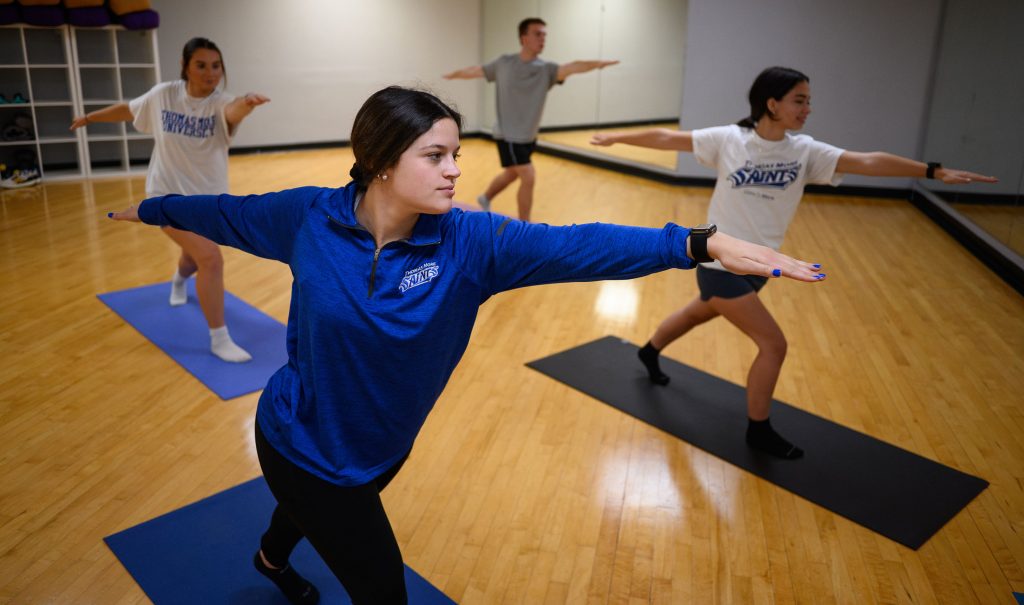
Balancing Ambition and Wellbeing: A Current College Student’s Perspective
Submitted by Alivia Friend ’25 | reprinted with permission from April 12, 2025 LinkedIn publication
Throughout my life, I’ve consistently pushed myself—academically, physically, and mentally. In my senior year of high school, I balanced being an officer in three clubs, working two jobs, competing as an all-star cheerleader, and training for college-level cheer—all while maintaining a 4.0 GPA. Before starting college, I was given all the usual warnings: “College will be a lot harder,” “You’ll have to give something up,” and so on. So I began cautiously—taking 15 credit hours, working two jobs, and focusing on cheer. After successfully managing my first year, I decided to challenge myself with 18 credit hours. I quickly learned that I could handle the workload, and from then on, I took 18 credit hours every semester. In the fall of my junior year, I discovered Thomas More’s 4+1 program and decided to apply. I was thrilled to be accepted, which meant I would begin MBA classes that November. By the end of that same year, I was invited to serve as president of REDI and offered a position as the cheer coach for a local high school. I carefully considered whether I was taking on too much—but ultimately, I said yes to both opportunities! So here I am now, just finished off my senior season, mentoring the next REDI president, counting down to graduation, and continuing my journey through the MBA program.
Pursuing a master’s degree is often seen as an investment for one’s future. During this time one should experience growth, specialization, and opportunity—driven by ambition and a desire to excel in all that life has to offer. But behind the academic award and “congratulations,” lies the reality of the delicate, daily dance of balancing ambition and one’s personal wellbeing.
I’ve come to understand, getting a higher education means the workload gets longer and harder, the preaching about networking relentlessly, and to make sure we are going the extra mile on group projects. But without intentional care for mental, emotional, and physical health, that same ambition can lead to burnout, anxiety, and chronic fatigue.
The Weight of Expectations
Once you are at the grad level, you’re expected to be excellent. There is no time to relearn anything. While I do enjoy being around peers who are driven and goal-oriented like me, one can feel pressure at times. There’s always an internal drive to stay ahead— making sure I keep up with jobs within my field, taking on more leadership opportunities, earning more certifications, doing more projects, etc. In grad school, success alone often doesn’t feel like enough. You’re expected to be impressive and stand out among your peers and others in your field. What makes this even more challenging is the internalized belief that our worth is measured by what you have to show. The idea that if we slow down, we’ll fall behind.
I believe like most of my peers our competition isn’t with each other but within ourselves. Our goals/ expectations we set for ourselves are sometimes bigger than they need to be. The fear of missing out on opportunities, of being overlooked by higher ups, and/or falling short of our own ambition. It’s draining. And if we don’t step back to recognize it, we risk getting caught in a cycle that strips away the joy, growth, and purpose that brought us here in the first place.
Redefining Success
A few weeks back I felt very overwhelmed by everything I was taking on. Balancing school work, three jobs, keeping up with my health, running a club, cheer, and personal responsibilities – I was beyond mentally and physically exhausted- I was actually making myself physically sick because my body needed a break. I had to take a weekend off and rethink everything I was doing, I redefined success and what that meant to me/looks to me.
Here is what I realized, success isn’t just about accomplishments- it’s also about sustainability. I can half do a million things or I can pick a few things and give 100%. I had to stop thinking like “how much can I get done in one day,” to “what actually needs to be done right now/what means the most to me right now.” I knew I had to set boundaries, I needed to start saying no to people and things, I needed to sleep more than 4 hours a night, I needed to eat better, I needed to give myself 30 minutes a day to do some kind of exercise, etc.

Practical Strategies for Balance
Here are a few strategies that have helped me—and that I often recommend to others my age, but I feel it can apply to anyone!
- Schedule self care. Rest is a requirement. If you don’t schedule time for you, your body will do it and it will be at the most inconvenient time. (Ex- Sleep in, get a facial, go to the gym)
- Embrace “good enough.” Perfectionism is a trap. Sometimes, 50-90% effort is all that a task needs.
- Support System. Connect with friends, classmates, family, mentors whoever reminds you that you’re not alone.
- Celebrate small wins. I get a dessert every Friday to end my week/start my weekend.
Ambition with Compassion
Ultimately, ambition and wellbeing need to go together, not against each other. When we care for ourselves, we’re better able to show up with creativity, resilience, and purpose. And when we pursue our goals with intention and self-compassion, we create a more fulfilling and sustainable path forward. As I continue through the MBA program, I’m learning that it’s not about achieving everything—it’s about becoming someone I’m proud of. And that includes being kind to myself.
I hope this read inspires you to take a step back and better yourself mentally.

Comments are closed, but trackbacks and pingbacks are open.